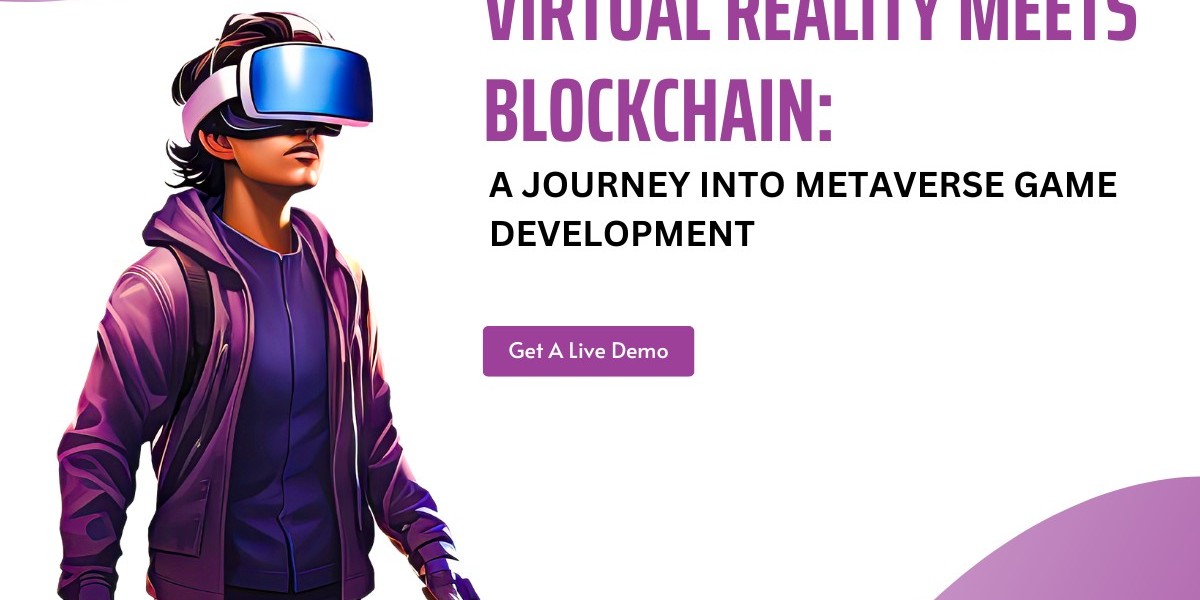In the evolving landscape of gaming, the fusion of Virtual Reality (VR) and blockchain technology is creating a seismic shift, giving rise to the metaverse — a virtual world where players can interact, socialize, and even earn real-world rewards. This blend of immersive experiences and decentralized economies is transforming the way we think about gaming. Let’s embark on a journey to explore how metaverse game development is shaping the future of entertainment.
What is the Metaverse?
The metaverse is more than just a virtual playground. It’s an interconnected, persistent digital space where users can live parallel lives, own virtual assets, and even create their own economies. Metaverse games push this concept further, offering expansive environments where players can create, own, and trade assets — all secured by blockchain technology.
How Virtual Reality Enhances the Metaverse Experience
At the heart of the metaverse is Virtual Reality (VR), which brings unprecedented immersion to gaming. With VR, players aren't just looking at a screen; they are stepping into the game world. From exploring distant galaxies to attending virtual concerts, VR makes it possible to experience games as fully interactive, 3D environments.
In metaverse games, VR creates a deeper level of engagement:
- Immersive Interactions: Players can interact with virtual environments and objects just as they would in the real world.
- Social Connectivity: VR-powered avatars allow for rich, life-like social interactions, making the metaverse a communal space for friends, colleagues, and fellow gamers.
- Creative Freedom: Virtual spaces let players build their worlds, contributing to a player-driven ecosystem of games and experiences.
The Role of Blockchain in Metaverse Game Development
While VR enhances the experience, blockchain technology adds a layer of security and ownership to the metaverse. Blockchain enables decentralized gaming economies where users can truly own virtual assets, from unique skins to entire plots of land. These assets exist as Non-Fungible Tokens (NFTs) on the blockchain, making them secure, traceable, and tradable across different platforms.
Key blockchain-driven features in metaverse game development include:
- True Ownership: Players can own, sell, and trade in-game assets outside of the game, giving real-world value to virtual items.
- Interoperability: Blockchain ensures that assets can be moved across different games and platforms, breaking the barriers of traditional gaming ecosystems.
- Decentralization: In a blockchain-powered metaverse, the control shifts from centralized authorities to the players themselves, fostering greater trust and transparency.
Notable Examples of Metaverse Game Development
Several pioneers are leading the charge in combining VR and blockchain to create metaverse games:
- Decentraland
A fully decentralized virtual world where players can buy land, build structures, and explore a world governed by its users. - The Sandbox
A voxel-based metaverse game where users can create, own, and monetize their gaming experiences, driven by blockchain technology. - Axie Infinity
A popular play-to-earn game where players can breed, collect, and battle creatures called Axies, which are NFTs on the blockchain. - Somnium Space
A VR-centric metaverse focused on creating a shared, decentralized world where users can socialize, trade, and explore together.
Why Metaverse Game Development is the Future of Gaming
The convergence of Virtual Reality and blockchain technology has unlocked endless possibilities for game development. Players are no longer passive participants; they are now creators, investors, and community builders. As blockchain ensures ownership and VR deepens immersion, the metaverse transforms gaming into an economic and social platform where the real and virtual worlds merge.
For game developers, the metaverse represents an opportunity to build sustainable economies, where player contributions are rewarded in the form of tangible assets. For gamers, it opens the door to a new realm of entertainment that goes beyond traditional gaming — one that’s immersive, player-owned, and rich with potential for creativity and innovation.
Conclusion
Metaverse game development is redefining the boundaries of gaming. By integrating VR and blockchain, developers are creating expansive digital universes where players can own, create, and interact in ways never before possible. As we look to the future, the metaverse will undoubtedly become a critical part of the gaming experience, forever changing how we play, connect, and earn in the virtual world.
At Osiz Technologies, we are proud to be at the forefront of this exciting evolution. Our expertise in blockchain and VR allows us to craft innovative metaverse solutions, empowering players to engage in vibrant, player-driven economies. Through our commitment to developing immersive games and experiences, we are not just contributing to the gaming ecosystem; we are shaping its future.
For Live Demo >> Metaverse Game Development Company








